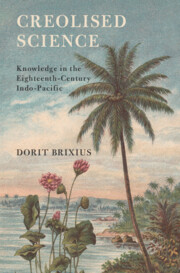Book contents
- Creolised Science
- Science in History
- Creolised Science
- Copyright page
- Dedication
- Contents
- Figures
- Acknowledgements
- Author’s Note
- Abbreviations
- Introduction
- 1 The Limits of French Colonial Visions and Science
- 2 The Acquisition of Knowledge and Plants, from Madagascar to China
- 3 Agriculture and Everyday Knowledge
- 4 Enslaved People as Knowledge Carriers
- 5 The Cross-Cultural Quest for Spices in South East Asia
- 6 Materials, Environment, and the Application of Knowledge
- Conclusion
- Bibliography
- Index
4 - Enslaved People as Knowledge Carriers
Published online by Cambridge University Press: 03 April 2024
- Creolised Science
- Science in History
- Creolised Science
- Copyright page
- Dedication
- Contents
- Figures
- Acknowledgements
- Author’s Note
- Abbreviations
- Introduction
- 1 The Limits of French Colonial Visions and Science
- 2 The Acquisition of Knowledge and Plants, from Madagascar to China
- 3 Agriculture and Everyday Knowledge
- 4 Enslaved People as Knowledge Carriers
- 5 The Cross-Cultural Quest for Spices in South East Asia
- 6 Materials, Environment, and the Application of Knowledge
- Conclusion
- Bibliography
- Index
Summary
In its central position, Chapter 4, with its focus on enslaved people, brings together all the aspects discussed in Chapters 2, 3, 5, and 6. It highlights the importance of the enslaved people in Mauritius, both for their labour and as sources of plant knowledge. Making an important contribution to the history of slavery and natural history, it serves as a link between the chapters on staple crops (Chapters 2 and 3) and those on commercial crops (Chapters 5 and 6), because it elaborates on both types of crops in relation to slavery. In particular, Chapter 4 reveals the disconnects of knowledge circulation. It seeks to explain what happened when new and unknown crops were introduced and knowledge of their cultivation or preparation techniques was lacking or faulty. Lastly, this chapter focuses on the Bengali slave gardener, Charles Rama. His knowledge of cultivation earned him praise from French actors, and he was later freed because of it. In the same way, the chapter examines the work of the enslaved gardener Hilaire, who initiated and tested the new grafting methods that were adopted by European-trained naturalists in the island. These two cases not only highlight the importance of the enslaved people’s knowledge, but more importantly, they reveal the shortcomings of European plant knowledge within the creolising processes.
Keywords
- Type
- Chapter
- Information
- Creolised ScienceKnowledge in the Eighteenth-Century Indo-Pacific, pp. 118 - 155Publisher: Cambridge University PressPrint publication year: 2024



